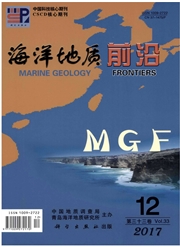

 中文摘要:
中文摘要:
对东海中南部陆架R22、R23、R24和R25孔岩心样品进行生物地层学、沉积地层学和年代地层学分析,将钻孔末次盛冰期以来的沉积自上而下划分为浅海相、陆架沙脊相、河口三角洲相3个层位,揭示了钻孔附近区域海进序列的沉积历史,即17~16ka BP之前的末次盛冰期,本区海水已疏干,沉积了R25孔Ⅳ陆相地层,当时海岸线已退至现今100m等深线以外;末次盛冰期之后海平面上升,在13~10ka BP的冰消期,海平面波动式稳定,沉积了本区4孔的Ⅱ层沙脊层;10ka BP以来,海面上升,直至今日沉积了砂层上覆的Ⅰ粉砂黏土层。在水深较大的R25孔中,还揭示了末次盛冰期前的海退地层序列和沉积环境。
 英文摘要:
英文摘要:
Integrated stratigraphic approaches are adopted for the study of holes of R22, R23, R24, and R25 in the East China Sea Shelf. The deposits after the Last Glacial Maximum are divided into 3 formations from top to bottom i. e. the neritic facies, continental shelf sand ridges facies and the estuarine deltaic facies respectively. The transgressive history of the study area was established as follows: (1) the terrestrial deposit of the layer R25IVwas formed when coastline regressed to 100m of i- sobath before 17-16 ka BP; (2)the sea level rose after LGM, and sand ridges H in 4 holes was deposi- ted when sea level fluctuated and stabilized during the last deglaciation period of 13~10 ka BP; (3) the silty clay I above the sand ridges was deposited during the period when the sea level has remained in rising from 10 ka BP to present. The regressive stratigraphie sequence and the environmental evolution before LGM are revealed through R25 which is located in a deeper area.
 同期刊论文项目
同期刊论文项目
 同项目期刊论文
同项目期刊论文
 期刊信息
期刊信息
